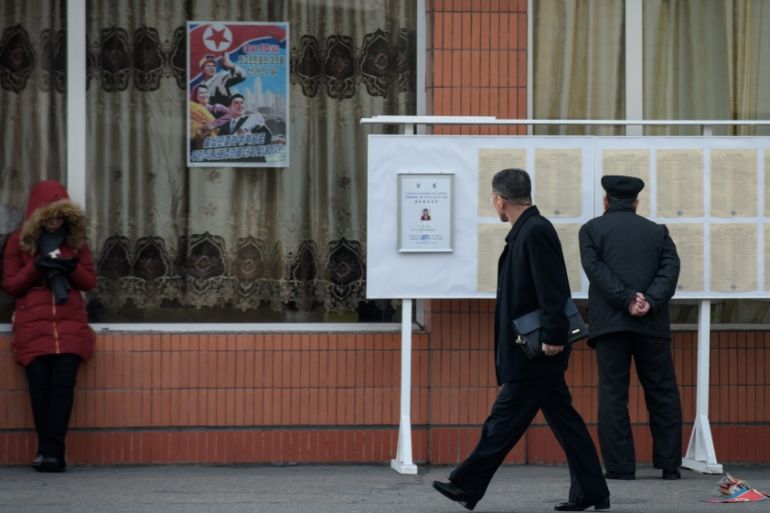‘Self-legitimisation’: North Koreans vote for new parliament
Millions cast their votes to elect members of the national legislature without being able to choose their candidates.

Millions of North Koreans are going to the polls on Sunday to elect roughly 700 members of the national legislature.
The elections, held every five years, are for the entire Supreme People’s Assembly, its rubber-stamp legislature.
Keep reading
list of 4 itemsNorth Korea says Kim Jong Un oversaw test of new hypersonic weapon
North Korea claims progress in development of hypersonic missile
North Korea’s Kim oversees ‘super-large’ rocket launcher drills
There is only a single candidate registered for each constituency and, under North Korean law, citizens can vote from the age of 17. The elections will replace those picked in the first parliamentary elections under the current leader in March 2014.
The candidates are selected by the ruling Korean Workers’ Party and a couple of other smaller coalition parties – Social Democratic and Chondoist Chongu – that have seats in the assembly but exercise little independent power.
North Korean leader Kim Jong Un, who recently held a second round of talks with US President Donald Trump in Vietnam, is the most prominent candidate and is running for re-election in his Pyongyang district.
The candidates include workers, farmers, intellectuals and soldiers striving to uphold leader Kim’s ideology and leadership, and backing his push for national development, Yonhap news agency reported citing North’s state media.
Voting is generally regarded as a duty and responsibility in North Korea. After the last election in 2014, North Korean state media reported a 99.97 percent voter turnout, and called it “an expression of the absolute support and trust of all voters in the DPRK government”.
“The election will strikingly manifest the fixed will of our people to firmly trust and uphold to the last Supreme Leader Kim Jong Un despite storm and stress,” the ruling party’s official daily said in a commentary on Sunday.
“All the people have to fully display through the election the invincibility and might of the DPRK advancing by dint of the single-minded unity,” it said, using the acronym for the country’s official name, the Democratic People’s Republic of Korea.
Voting began at around 9am local time (midnight GMT) depending on the location and continues until late evening.
Voters show election officials their ID cards to receive their ballot, which they cast in a private booth. If they approve, they simply put the ballot in the box. If they do not approve, they cross the name out and put it in the same box but in practice that is unheard of.
It’s Election Day in North Korea pic.twitter.com/PaiG7lknOI
— Sebastien Berger (@slhberger) March 10, 2019
“I’m very proud to be voting for the first time,” said 19-year-old university student Kim Ju Gyong, who cast her vote on Sunday morning in Pyongyang.
“I feel happy to be a citizen and I want to do my best for the future of my country.”
With a total absence of electoral competition, analysts say the vote is held largely as a political rite to enable the authorities to claim a mandate from the people.
It was the result of “established institutional inertia and a need to legitimise the government by simulating democratic procedure”, said Andrei Lankov of Korea Risk Group.
“North Korea is just emulating all other Communist states,” said Lankov. “The early Communists sincerely believed that they were producing a democracy the world had never seen. So they needed elections and it became a very important part of self-legitimisation.”
According to Youngshik Bong, a research fellow at the Yonsei University in Seoul, Kim and his administration will be trying to “appease” the North Korean public following the failed Hanoi summit.
“This is a crucial moment for North Korea’s leadership,” Bong told Al Jazeera.
“Kim is trying to appease the public because North Koreans had such high hopes for breakthroughs made in Vietnam and that didn’t happen.
“While North Korea is the most isolated country in the world, it does not mean that North Koreans are unaware of what is happening in the world.”
|
|